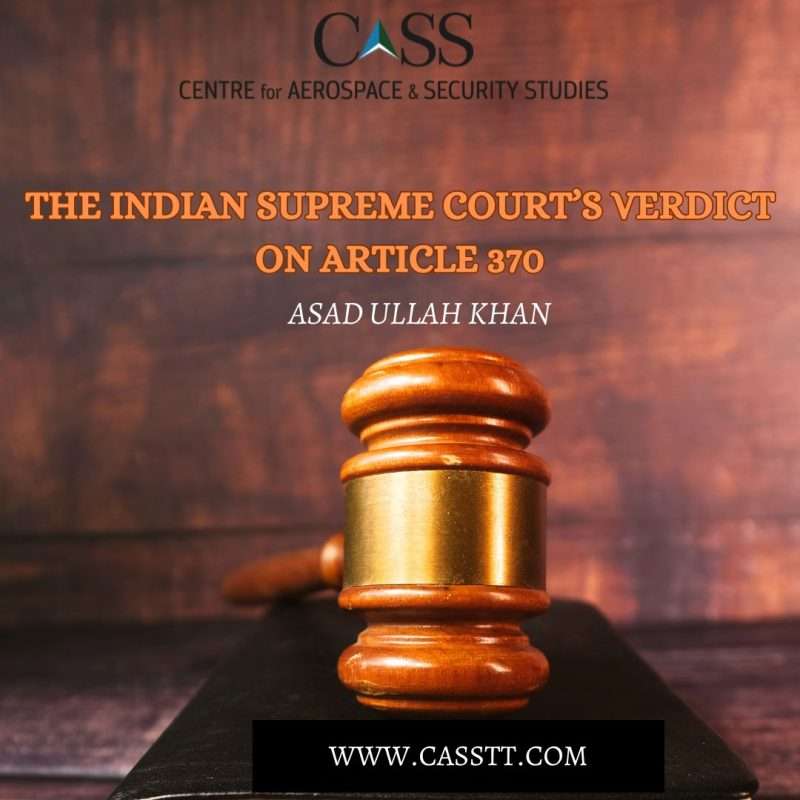The Supreme Court of India has recently validated the abrogation of Article 370 of the Indian Constitution. This recent development has sparked questions about the transparency and efficacy of India’s legal, institutional, and political systems. The Bharatiya Janata Party (BJP)’s political campaign and its pre-election manifesto has particularly raised concerns regarding the independence and impartiality about the country’s judiciary.
So, why is this decision important for the BJP?
The BJP has been strategically pursuing its plan of clamping down on India’s only Muslim-majority region; and maximising the trajectory of its success in the electoral process. However, this abrogation was on the BJP’s agenda even before coming into power. However, its careful use of strategic planning has gained massive populist support. Also, by exploiting nationalist sentiment, the BJP is trying to endorse this abrogation as a decisive step towards the integration of Indian Illegally occupied Jammu and Kashmir (IIOJK) in the Indian Union.
The BJP’s aims and ambitions first came into the limelight when it constitutionally annexed the region by revoking the Special Status of Jammu and Kashmir in 2019 with the abrogation of Article 370. Earlier, this article granted a special constitutional status to the Kashmir region. Article 370, along with Article 35A, limited the legislative powers of the Indian Parliament from intervening in the state of Jammu and Kashmir’s legal status. Moreover, the articles provided special rights and privileges to the residents of the occupied territory in accordance with the legal framework that protected their special status. Prime Minister Narendra Modi, being a right-wing nationalist leader, altered the legislative nature of the IIOJK. Utilising its parliamentary majority, the government successfully repealed the special status of Jammu and Kashmir through legal means. This legislative action steered an internationally recognised dispute in a direction that resonates with the characteristics of an authoritarian democracy. It hints at inclinations towards fascist notions of religious dominance and ethnic superiority.
So, why now? The choice of announcing the verdict by the Indian Supreme Court right before the upcoming 2024 Lok Sabha Elections will play an important role in achieving the nationalist and electoral objectives of the ruling elite in India. First, this particular decision has been announced to create a debate before the elections about the need and urgency of abrogation of Article 370. Similarly, this illegal action was taken to build a pre-electoral notion of the BJP as an assertive political force adept in securing the so-called ‘national security’ objective of the Indian state. Therefore, portraying this ‘legal bloodshed’ as a ‘legal transformation’ supported by the highest court of India is an attempt to legitimise constitutional steps taken illegally. The verdict also aligns with the BJP’s Hindutva-driven efforts to internalise the Jammu and Kashmir conflict.
It comes as no surprise that the BJP has been trying to build up its narratives on Article 370 by deftly balancing political strategies, electoral ambitions, and legal mechanisms. In fact, the Supreme Court’s departure from its 2018 decision on the permanence of Article 370 casts doubt on the impartiality of India’s judicial institutions. It clearly demonstrates that even the highest institution in the country is unable to withstand the pressures exerted by the ruling party; and that in the so-called ‘world’s largest democracy’, public institutions are manipulated to gain political power.
Despite India’s attempts, the core issue persists: Jammu and Kashmir remains a prominent item on the UN agenda, signifying its international significance. The United Nations Security Council (UNSC) Resolutions grant the right of self-determination to the Kashmiris, underscoring the international community’s acknowledgement of the dispute. Consequently, any unilateral actions by India are unlikely to alter the fundamental nature of the Jammu & Kashmir dispute.
In light of these circumstances, it is imperative for the international community and the UN to acknowledge the complex realities of the Jammu & Kashmir dispute and actively engage in resolving the conflict. This commitment is essential to honour the promised right of self-determination for the Kashmiri people. Given the multifaceted challenges surrounding this historical territorial dispute, it is crucial for India to abandon its conventional approach and adopt a more progressive strategy. Equally, the international community bears a significant responsibility to ensure that principles of justice, equality, and self-determination are upheld without compromise.
Asad Ullah Khan is a Senior Research Associate at the Centre for Aerospace & Security Studies, (CASS), Islamabad, Pakistan. He can be reached at cass.thinkers@casstt.com
Design Credit: Mysha Dua Salman




